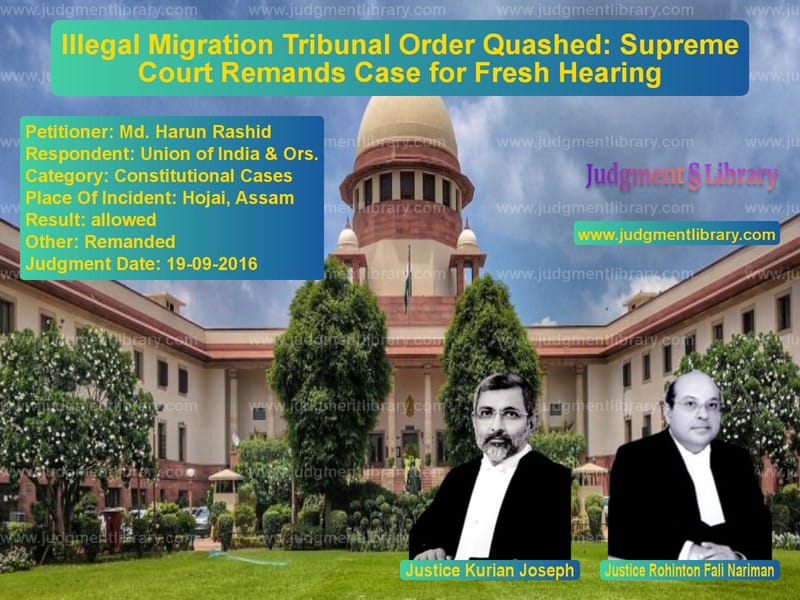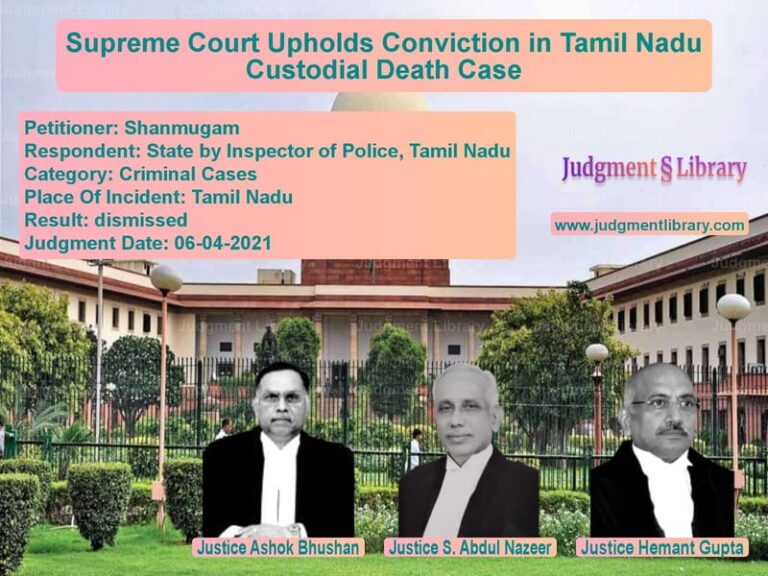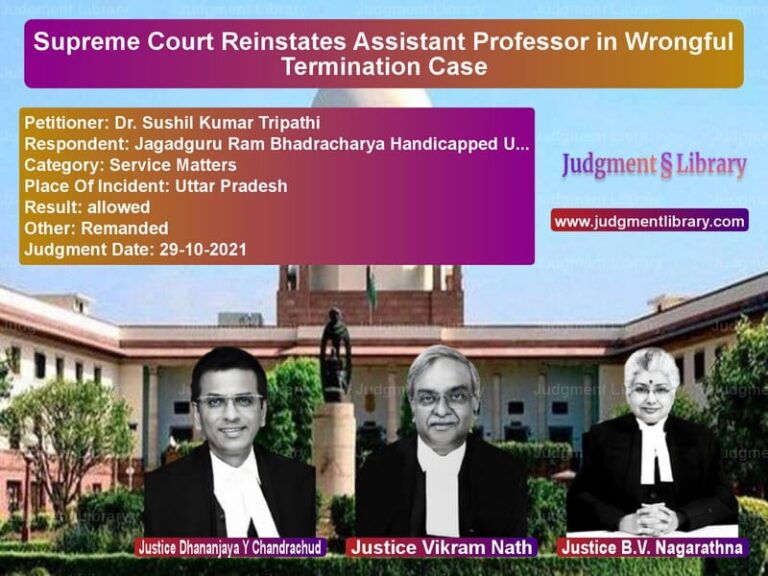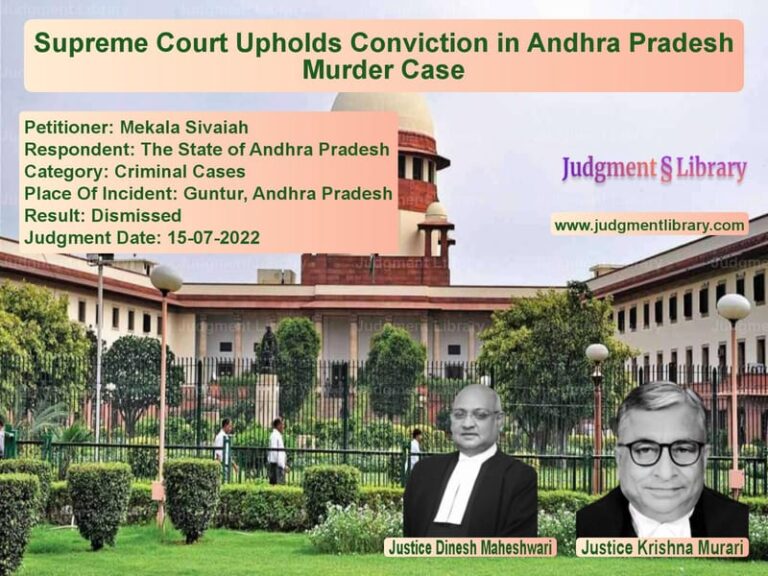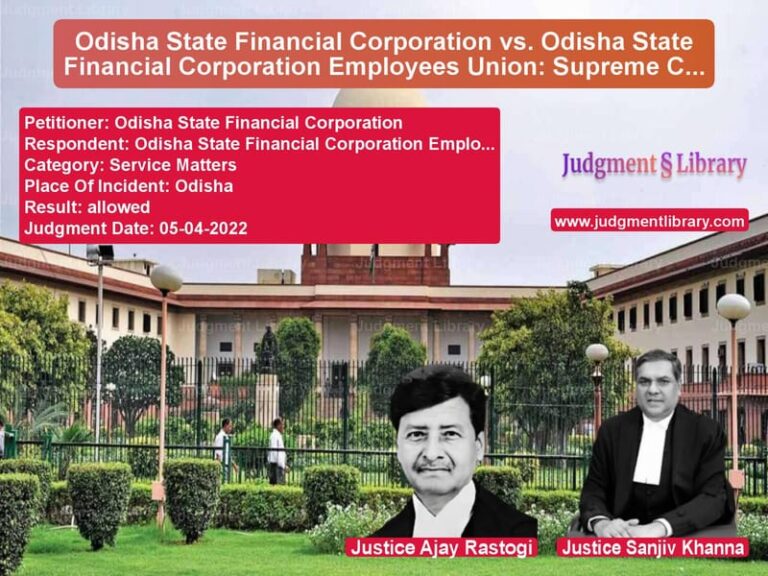Illegal Migration Tribunal Order Quashed: Supreme Court Remands Case for Fresh Hearing
The case of Md. Harun Rashid v. Union of India & Ors. concerns the appellant’s challenge to an order by the Illegal Migrants (Determination by Tribunal) (IMDT) Act Tribunal in Assam, which declared him an illegal migrant. The Supreme Court ultimately set aside the High Court’s dismissal of his petition due to delay, remanding the matter to the Foreigners Tribunal for a fresh hearing.
This judgment is significant in the context of India’s citizenship laws, Assam’s migration concerns, and judicial review in cases involving alleged illegal immigrants.
Background of the Case
Md. Harun Rashid was declared an illegal migrant by the Illegal Migrants (Determination) Tribunal, Hojai, Assam, through an order dated February 8, 2005. He sought to challenge this order but faced complications due to the abolition of the IMDT Act in 2005. The IMDT Appellate Tribunal, where he initially intended to appeal, ceased to exist following the Supreme Court’s decision in Sarbananda Sonowal v. Union of India.
Having lost the appellate forum, the appellant approached the Gauhati High Court after a considerable delay, requesting a review of his case. The High Court dismissed his petition, citing the delay as inordinate and unjustified. Aggrieved by this decision, he moved the Supreme Court.
Arguments of the Petitioner
Md. Harun Rashid, through his legal representatives, argued:
- He was unable to present his documents properly before the IMDT Tribunal due to lack of proper legal assistance.
- The abolition of the IMDT Act deprived him of an appellate remedy, causing delay in approaching the High Court.
- The delay in filing the petition should be condoned in the interest of justice since his fundamental right to prove his citizenship was at stake.
Arguments of the Respondents
The Union of India and the State of Assam contended:
- The appellant had ample opportunity to contest his citizenship before the IMDT Tribunal but failed to do so in time.
- The delay of over a decade in filing a writ petition was unreasonable and could not be condoned.
- Allowing a fresh review would set a precedent for others to challenge long-decided cases, burdening the judicial system.
Supreme Court’s Observations and Judgment
The Supreme Court bench, comprising Justices Kurian Joseph and Rohinton Fali Nariman, ruled in favor of the appellant, emphasizing the need for procedural fairness.
Key Observations
- The abolition of the IMDT Act left affected individuals without an appellate remedy, warranting a fresh opportunity to present their case.
- The principles of natural justice require that a person be given a fair chance to prove their citizenship.
- The Foreigner’s Tribunal was the appropriate body to reassess the appellant’s documents and decide the case on merits.
Excerpts from the Judgment
The Court stated:
“Having regard to the facts and circumstances of the case mentioned above, we are also of the view that interest of justice would be served, in case, the matter is remitted to the Foreigner’s Tribunal, Shankardev Nagar, Hojai, Assam, so as to have an opportunity for the appellant to prove his case.”
Further, it ruled:
“Accordingly, we set aside the impugned judgment and remand the matter to the Foreigner’s Tribunal. Till orders are passed as above, all proceedings for arrest and deportation of the appellant shall be deferred.”
Legal Implications
The ruling reinforces several legal principles:
- The right to appeal should not be denied due to procedural technicalities if fundamental rights are at stake.
- Judicial review must consider the abolition of legal forums and the impact on pending cases.
- The decision sets a precedent for reopening cases where procedural fairness was compromised.
Impact of the Judgment
This ruling has broad implications for citizenship and migration laws:
- Individuals affected by the abolition of the IMDT Act may seek fresh hearings before the Foreigners Tribunal.
- The decision underscores the importance of procedural fairness in citizenship determination cases.
- Authorities must ensure that individuals declared illegal migrants have a reasonable opportunity to present evidence.
Conclusion
The Supreme Court’s ruling in Md. Harun Rashid v. Union of India underscores the need for procedural justice in cases involving citizenship disputes. The judgment not only protects the appellant’s right to prove his citizenship but also sets a precedent for fair hearings in similar cases.
This case highlights the intersection of constitutional rights, immigration law, and judicial review, ensuring that individuals accused of illegal migration receive a fair opportunity to defend their status before deportation proceedings are enforced.
Don’t miss out on the full details! Download the complete judgment in PDF format below and gain valuable insights instantly!
Download Judgment: Md. Harun Rashid vs Union of India & Ors Supreme Court of India Judgment Dated 19-09-2016-1741883861484.pdf
Direct Downlaod Judgment: Direct downlaod this Judgment
See all petitions in Fundamental Rights
See all petitions in Public Interest Litigation
See all petitions in Legislative Powers
See all petitions in Judgment by Kurian Joseph
See all petitions in Judgment by Rohinton Fali Nariman
See all petitions in allowed
See all petitions in Remanded
See all petitions in supreme court of India judgments September 2016
See all petitions in 2016 judgments
See all posts in Constitutional Cases Category
See all allowed petitions in Constitutional Cases Category
See all Dismissed petitions in Constitutional Cases Category
See all partially allowed petitions in Constitutional Cases Category

